Kingr321 - Untitled

More Posts from Kingr321 and Others
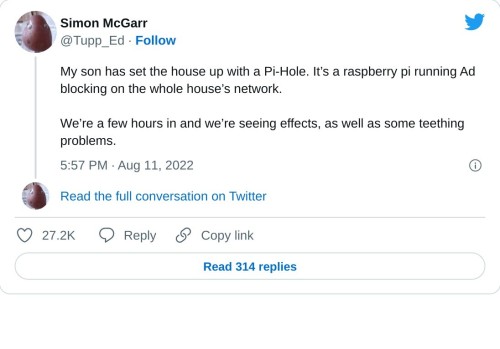
>First, we’ve discovered that about a quarter of all the internet connection in or out of the house were ad related. In a few hours, that’s about 10,000 out of 40,000 processed.
>We also discovered that every link on Twitter was blocked. This was solved by whitelisting the https://t.co domain.
>Once out browsing the Web, everything is loading pretty much instantly. It turns out most of that Page Loading malarkey we’ve been accustomed to is related to sites running auctions to sell Ad space to show you before the page loads. All gone now.
>We then found that the Samsung TV (which I really like) is very fond of yapping all about itself to Samsung HQ. All stopped now. No sign of any breakages in its function, so I’m happy enough with that.
>The primary source of distress came from the habitual Lemmings player in the house, who found they could no longer watch ads to build up their in-app gold. A workaround is being considered for this.
>The next ambition is to advance the Ad blocking so that it seamlessly removed YouTube Ads. This is the subject of ongoing research, and tinkering continues. All in all, a very successful experiment.
>Certainly this exceeds my equivalent childhood project of disassembling and assembling our rotary dial telephone. A project whose only utility was finding out how to make the phone ring when nobody was calling.

>Update: All4 on the telly appears not to have any ads any more. Goodbye Arnold Clarke!
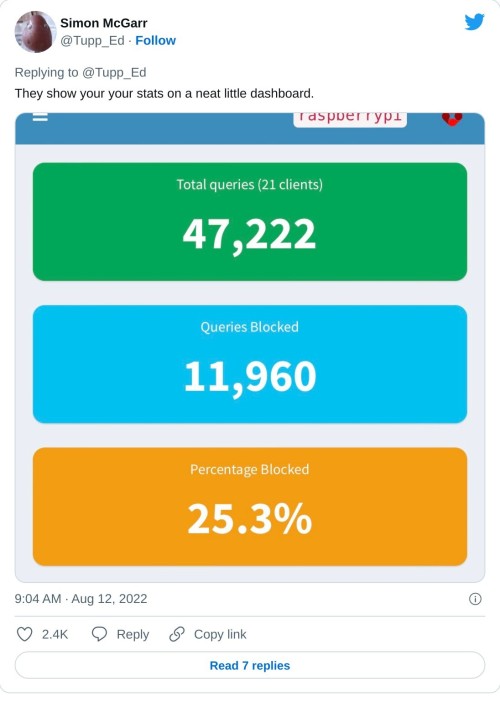
>Lemmings problem now solved.
>Can confirm, after small tests, that RTÉ Player ads are now gone and the player on the phone is now just delivering swift, ad free streams at first click.
>Some queries along the lines of “Are you not stealing the internet?” Firstly, this is my network, so I may set it up as I please (or, you know, my son can do it and I can give him a stupid thumbs up in response). But there is a wider question, based on the ads=internet model.
>I’m afraid I passed the You Wouldn’t Download A Car point back when I first installed ad-blocking plug-ins on a browser. But consider my chatty TV. Individual consumer choice is not the method of addressing pervasive commercial surveillance.
>Should I feel morally obliged not to mute the TV when the ads come on? No, this is a standing tension- a clash of interests. But I think my interest in my family not being under intrusive or covert surveillance at home is superior to the ad company’s wish to profile them.
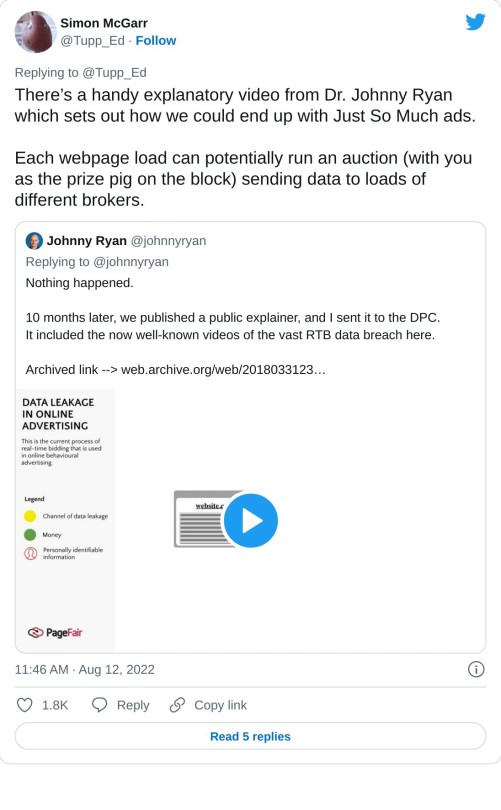
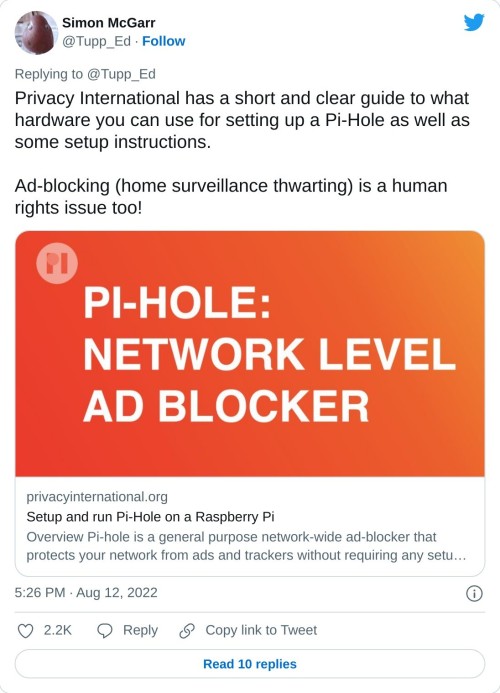
>Aside: 24 hours of Pi Hole stats suggests that Samsung TVs are very chatty. 14,170 chats a day.
>YouTube blocking seems difficult, as the ads usually come from the same domain as the videos. Haven’t tried it, but all of the content can also be delivered from a no-cookies version of the YouTube domain, which doesn’t have the ads. I have asked my son to poke at that idea.
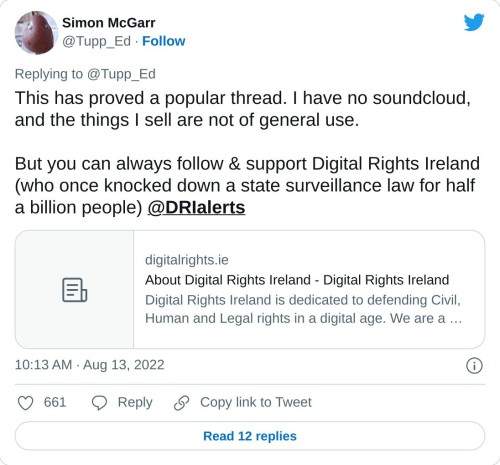


Fantastic Mr. Fox (2009, dir. Wes Anderson)

You know I will actually
























what my notifs look like currently
You guys just have to trust me on this one and click here okay?


@world-heritage-posts
“average person eats 3 spiders a year” factoid actualy just statistical error. average person eats 0 spiders per year. Spiders Georg, who lives in cave & eats over 10,000 each day, is an outlier adn should not have been counted
Things my extremely Italian physics professor has said:
“If you are walking in the woods nearby Chernobyl, you will probably be fine. But if you pick something up off the ground and eat it, you will die of radiation poisoning. Of course you may die if you eat things from the ground in other places, also, but likely not of radiation.”
“Unfortunately there is nothing I can teach you that will prevent you dying if there is on your house a hydrogen bomb. That is a politician problem. If any of you are president later, please do not hydrogen bomb my house.”
“Radioactivity could perhaps be used by terrorists, but it has not yet. Likely this is because terrorists do not study much physics.”
“Why is it that physics graduate students cannot make a nuclear bomb? It is not that they do not want to. They simply have not the money to buy the materials. Or anything else.”
-
 rcbertpattinscns reblogged this · 2 weeks ago
rcbertpattinscns reblogged this · 2 weeks ago -
 rcbertpattinscns liked this · 2 weeks ago
rcbertpattinscns liked this · 2 weeks ago -
 mommy-mortis reblogged this · 2 weeks ago
mommy-mortis reblogged this · 2 weeks ago -
 doubtfulmilk liked this · 2 weeks ago
doubtfulmilk liked this · 2 weeks ago -
 rainbowhearts8666 reblogged this · 2 weeks ago
rainbowhearts8666 reblogged this · 2 weeks ago -
 blvvdyindustries reblogged this · 2 weeks ago
blvvdyindustries reblogged this · 2 weeks ago -
 flowey4ever reblogged this · 2 weeks ago
flowey4ever reblogged this · 2 weeks ago -
 flowey4ever liked this · 2 weeks ago
flowey4ever liked this · 2 weeks ago -
 sleepless-mari liked this · 2 weeks ago
sleepless-mari liked this · 2 weeks ago -
 data-roxass reblogged this · 2 weeks ago
data-roxass reblogged this · 2 weeks ago -
 data-roxass liked this · 2 weeks ago
data-roxass liked this · 2 weeks ago -
 juhaku-inspired reblogged this · 2 weeks ago
juhaku-inspired reblogged this · 2 weeks ago -
 juhaku-inspired liked this · 2 weeks ago
juhaku-inspired liked this · 2 weeks ago -
 4daptation liked this · 2 weeks ago
4daptation liked this · 2 weeks ago -
 chirping-robyn reblogged this · 2 weeks ago
chirping-robyn reblogged this · 2 weeks ago -
 chirping-robyn liked this · 2 weeks ago
chirping-robyn liked this · 2 weeks ago -
 ninjagokata reblogged this · 2 weeks ago
ninjagokata reblogged this · 2 weeks ago -
 ninjagokata liked this · 2 weeks ago
ninjagokata liked this · 2 weeks ago -
 leo-does-things-101 liked this · 2 weeks ago
leo-does-things-101 liked this · 2 weeks ago -
 beyond-a-name reblogged this · 2 weeks ago
beyond-a-name reblogged this · 2 weeks ago -
 tonisbrain reblogged this · 2 weeks ago
tonisbrain reblogged this · 2 weeks ago -
 lee-scribbles-and-doodles liked this · 2 weeks ago
lee-scribbles-and-doodles liked this · 2 weeks ago -
 bandichree liked this · 2 weeks ago
bandichree liked this · 2 weeks ago -
 reliable-demon-whispers liked this · 2 weeks ago
reliable-demon-whispers liked this · 2 weeks ago -
 tom-the-dragon reblogged this · 2 weeks ago
tom-the-dragon reblogged this · 2 weeks ago -
 queencryo liked this · 2 weeks ago
queencryo liked this · 2 weeks ago -
 cosmictacos liked this · 2 weeks ago
cosmictacos liked this · 2 weeks ago -
 tradingcardkind reblogged this · 2 weeks ago
tradingcardkind reblogged this · 2 weeks ago -
 beamthechao reblogged this · 2 weeks ago
beamthechao reblogged this · 2 weeks ago -
 eesthetical liked this · 2 weeks ago
eesthetical liked this · 2 weeks ago -
 wrathful-banette reblogged this · 2 weeks ago
wrathful-banette reblogged this · 2 weeks ago -
 snowblossim reblogged this · 2 weeks ago
snowblossim reblogged this · 2 weeks ago -
 omskivar reblogged this · 2 weeks ago
omskivar reblogged this · 2 weeks ago -
 snowblossim liked this · 2 weeks ago
snowblossim liked this · 2 weeks ago -
 omskivar liked this · 2 weeks ago
omskivar liked this · 2 weeks ago -
 roisin-mairi reblogged this · 2 weeks ago
roisin-mairi reblogged this · 2 weeks ago -
 roisin-mairi liked this · 2 weeks ago
roisin-mairi liked this · 2 weeks ago -
 vampireautism reblogged this · 2 weeks ago
vampireautism reblogged this · 2 weeks ago -
 tom-the-dragon reblogged this · 2 weeks ago
tom-the-dragon reblogged this · 2 weeks ago -
 helix142 reblogged this · 2 weeks ago
helix142 reblogged this · 2 weeks ago -
 sylvleon reblogged this · 2 weeks ago
sylvleon reblogged this · 2 weeks ago -
 sylvleon liked this · 2 weeks ago
sylvleon liked this · 2 weeks ago -
 scare-crowen liked this · 2 weeks ago
scare-crowen liked this · 2 weeks ago -
 playingtherosangel liked this · 2 weeks ago
playingtherosangel liked this · 2 weeks ago -
 calmmyfears reblogged this · 2 weeks ago
calmmyfears reblogged this · 2 weeks ago -
 calmmyfears liked this · 2 weeks ago
calmmyfears liked this · 2 weeks ago -
 deepseaspecter liked this · 2 weeks ago
deepseaspecter liked this · 2 weeks ago -
 sofapup17 liked this · 2 weeks ago
sofapup17 liked this · 2 weeks ago -
 sirpolpoart liked this · 2 weeks ago
sirpolpoart liked this · 2 weeks ago
